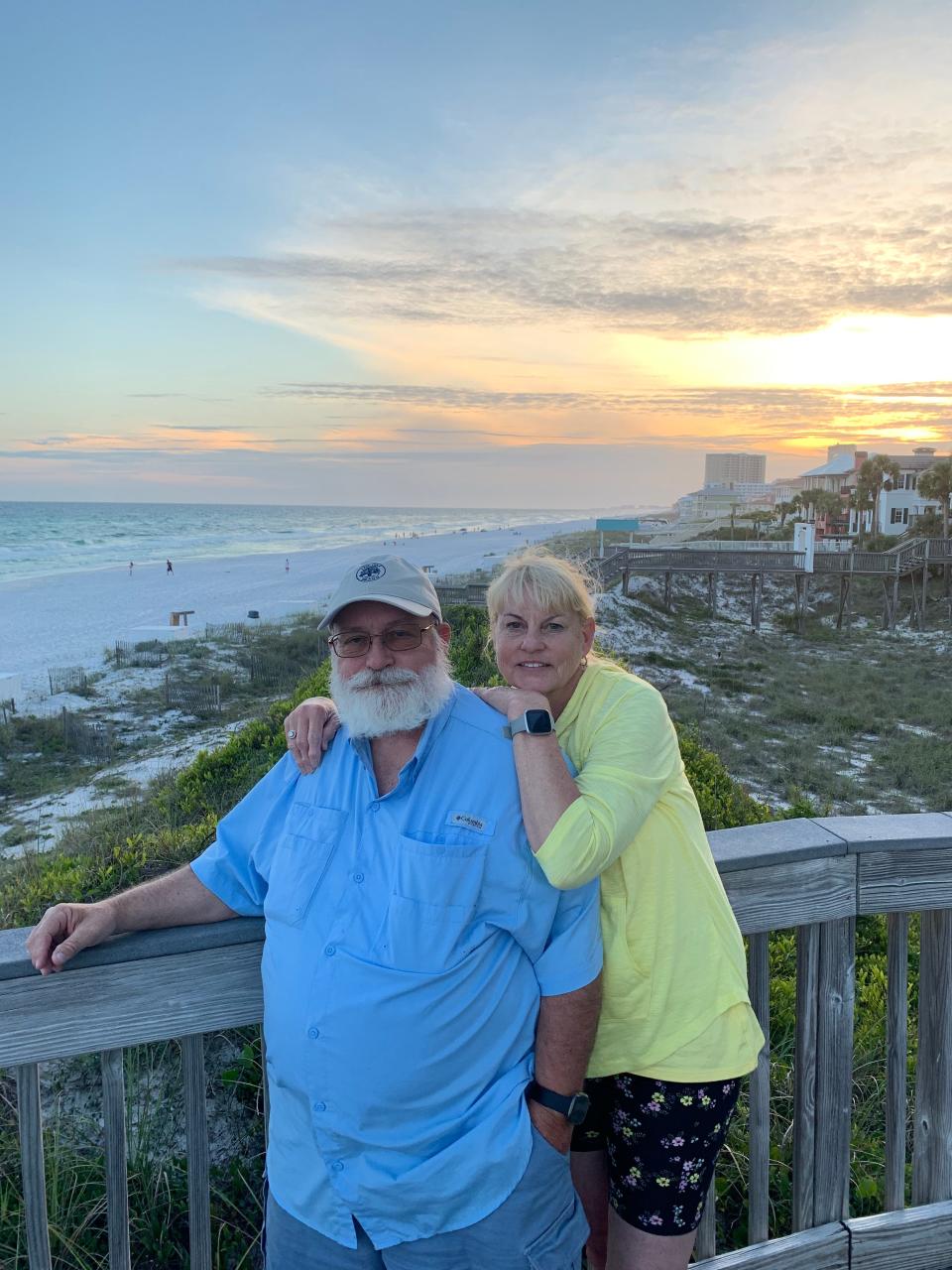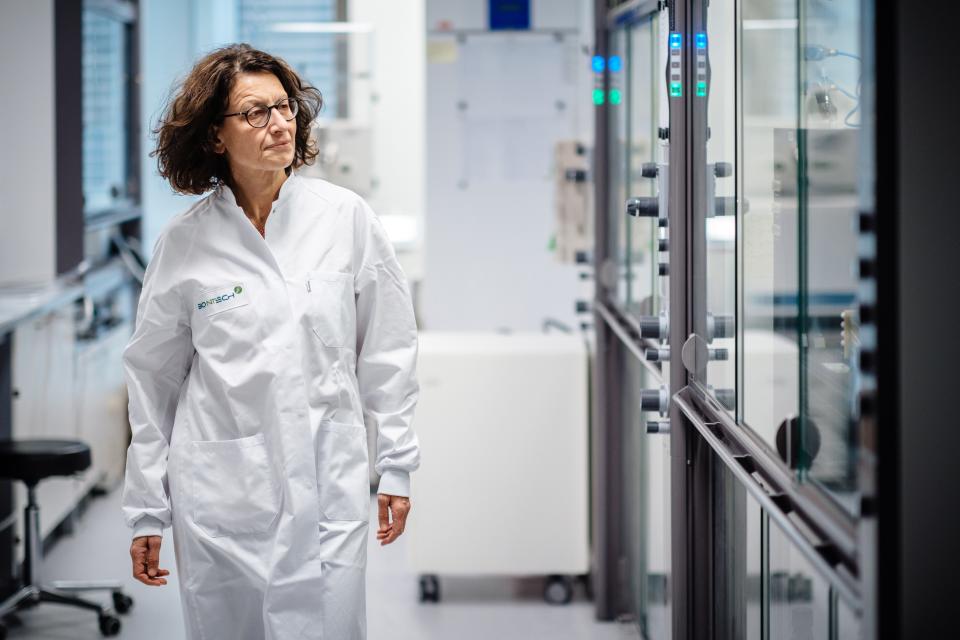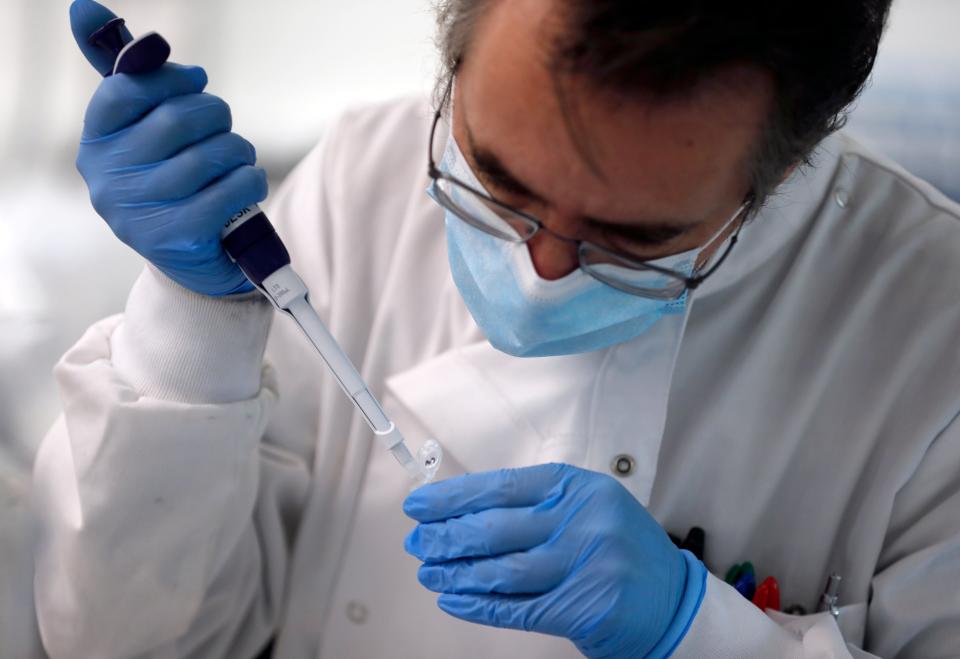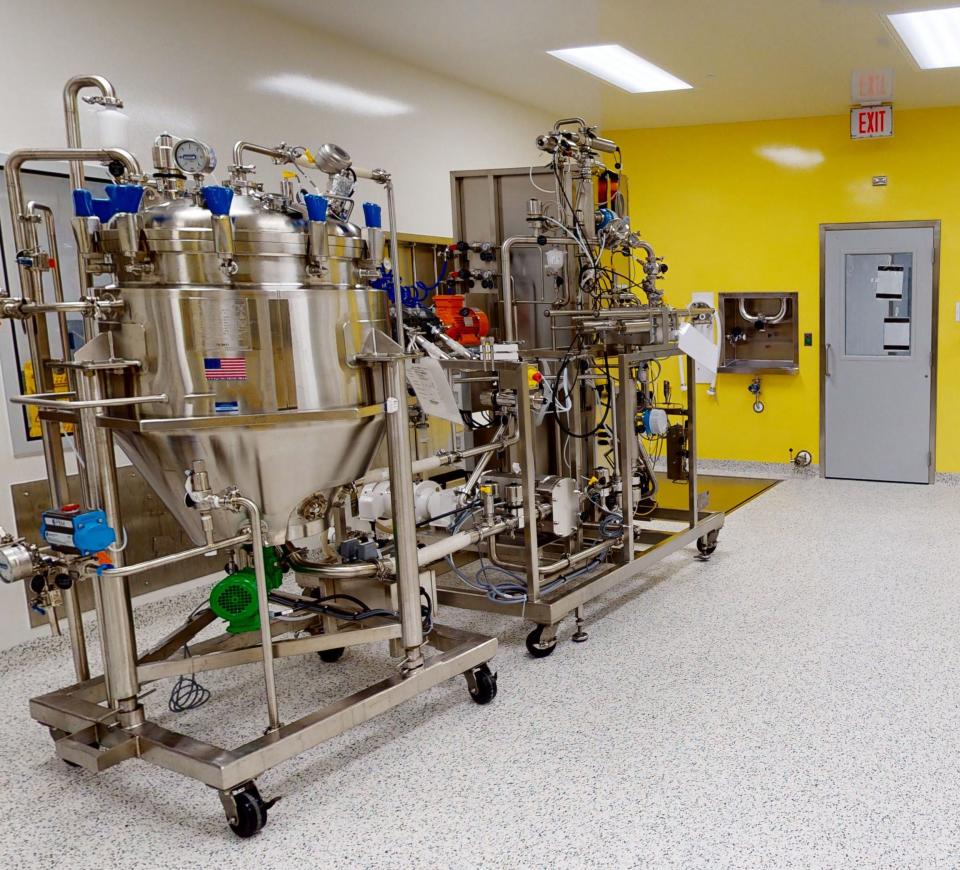The same mRNA technology used in COVID-19 vaccines could help treat cancer
Bobby Fentress learned about messenger RNA months before the rest of the world.
About a year before Fentress got his double shots of COVID-19 vaccine made with mRNA, the painting contractor was infused with a personalized version to fight his cancer.
Fentress, 68, was an early participant in a clinical trial intended to see whether a vaccine made with the same technology used to prevent COVID-19 could boost the immune system enough to search out and destroy lingering cancer cells.
Companies like Moderna and Pfizer's partner BioNTech, whose names are familiar from COVID-19 vaccines, are using mRNA to spur cancer patients' bodies to make vaccines that will – they hope – prevent recurrences and treatments designed to fight off advanced tumors.
If they prove effective, which won't be known for at least another year or two, they could be added to the arsenal of immune therapies designed to get the body to fight off its own tumors.
"We feel pretty good about enrolling patients on these trials and are hopeful that ultimately they can demonstrate improved outcomes," said Dr. Ryan Sullivan, a melanoma expert at Massachusetts General Hospital in Boston.
Sullivan doesn't expect mRNA to be a miracle.
"This is not the answer," he said. "But, hopefully, it's part of the answer."

Doctors are cautious because cancer vaccine development "has been littered with vaccines that haven't hit the mark," said Dr. Stephen Hahn, who had a career as an oncologist before running the Food and Drug Administration from 2019 until early this year.
He said he's more optimistic this time because of how much researchers have learned about the role the immune system plays in cancer.
"That gives us an edge to maybe finally get to the place where we need to be," said Hahn, who recently took a post with a venture capital firm, Flagship Pioneering. "That would be just a remarkable step for all of us."
At the moment, most of the mRNA cancer vaccine trials are targeting tumors such as melanoma and kidney cancer, where drugs called checkpoint inhibitors have already made a significant difference for many patients.
"My hope is that if we're successful, we'll be able to move into more tumor types where checkpoints haven't been as successful," said Meredith McKean, Fentress' oncologist at Sarah Cannon Research Institute in Nashville.
Good timing for a scary diagnosis
Fentress, of nearby Goodlettsville, Tennessee, thought he had a wart back in the summer of 2019 when he first noticed the odd bump on the middle finger of his left hand. He'd had lots of those.
At the urging of his wife, Jennie, he finally went to the dermatologist just before Thanksgiving. A few days later he got a call from the doctor. It wasn't just an ordinary wart, she told him, and he'd need to come back to get a biopsy.
He had dangerous stage 2c melanoma.
In early December, a surgeon amputated most of his left middle finger. Fentress, who is helping raise the two youngest of his five grandchildren, was told he had a 50% chance of recurrence. And if it did come back, his chances weren't good.
But his timing was.
Over the past decade, pharmaceutical companies around the world have been developing new ways to train the body's immune system to fight off tumors, particularly melanoma.
They had learned how to remove a brake installed by tumors, unleashing the warriors of the immune system. Ten years ago, only about 5% of people with advanced melanoma survived for five years. Now, nearly half make it that long.
Trials of mRNA cancer vaccines, like the one Fentress began in spring 2020, aim to boost that number even higher by adding soldiers to the fight.
Cancer is challenging to treat because the body recognizes cancer cells as part of itself and leaves them alone. Many of the targets of cancer therapy also are present in healthy cells, which is why cancer treatments are often so damaging.
Moderna, in a process similar to the other companies', took cells from Fentress' tumor. A computer analyzed the cells for tiny differences from normal cells that it could use as targets.
Then the company identified mutations that make protein variants found only on cancerous cells. They then create a single mRNA that triggers the body to make these proteins – just as COVID-19 vaccines trigger production of the spike protein that sits on the surface of the virus. The presence of these protein fragments triggers the immune system to attack anything with that protein.

In April 2020, at Sarah Cannon, Fentress got his first shots of mRNA tailored to his tumor.
"They knocked me off my butt for about two days," he said. "I've never been as cold in my life."
He also began receiving a so-called checkpoint blockade drug to unleash his immune system against his cancer. He hopes the combination of lifting the brakes and adding soldiers to the fight will keep his tumor from ever coming back.
Early this spring, he finished nearly a year of that treatment.
It's too soon to know whether the therapy will work, but his doctor, McKean, said he did well with the treatment.
"I'm cancer-free," Fentress said. "I'm very humble and very blessed."
Personalized cancer vaccines
Preventing recurrences is the "ideal setting" for mRNA technology, said Dr. Özlem Türeci, co-founder and chief medical officer of BioNTech.
Once a tumor has been largely removed through surgery, a vaccine can help generate new immune soldiers known as T cells.
"The T cells will outnumber (cancer cells) and will be able to control them," Türeci said.
Plus, a treatment soon after surgery may be able to prevent the tumor from outmaneuvering the body's immune defenses, she said.
As with Fentress, surgical samples or a biopsy are sent to a lab where a patient's cancer cells are compared with healthy ones.
A computer algorithm analyzes the mutations distinct to the cancer cells, looking for ones that trigger the production of T cells, said Melissa J. Moore, Moderna's chief scientific officer of platform research.
So far, she said, Moderna, working with partner Merck, has tested these personalized vaccines in about 100 patients.
They aim eventually to make a personalized mRNA vaccine within about 45 days after the patient's cancer surgery, during their recovery.
People who already have advanced cancer may not be able to wait for therapy. And while a few errant cancer cells are very diverse, once a tumor has spread throughout the body, it tends to develop consistent mutations, Türeci said.
So the companies also are developing treatments that can be premade and 'taken off the shelf' when a patient needs them.
Mutated cancer cells have proteins on their surface that can be targeted by an mRNA vaccine. For a tumor that has, say, five common mutations, a patient could get a combination of five of these vaccines.
On Friday, BioNTech announced it was launching a new trial for this approach, testing it in 120 melanoma patients Europe, the United Kingdom, Australia and the U.S. The new treatment, given in connection with an antibody from Regeneron, is aimed at four tumor-associated antigens. More than 90% of melanoma tumors contain at least one of the four.
Researchers now have a better understanding of how to stimulate the immune system, said Ulrike Gnad-Vogt, interim chief development officer for CureVac, a German mRNA company.

Plus, most earlier vaccines predated the checkpoint inhibitors. "The combination is important," Gnad-Vogt said.
What still needs to be proven, experts say, is whether mRNA vaccines can help win the battle against cancer, and if so, which approach will be better for which patients.
The federal government lists 29 studies that are underway or soon will be investigating mRNA cancer vaccines.
Because these therapies are still experimental, there's no talk yet of how much they will cost. Patients don't pay to participate in clinical research trials.
To be worth any cost, mRNA vaccines will have to have a significant influence on survival, adding years, not just weeks, to someone's life, said Sullivan of Massachusetts General. He would consider them justified if they could boost the long-term survival rate, which now hovers around 30% to 40%, to 50% to 80%.
Dr. David Braun a medical oncologist at Dana-Farber Cancer Institute in Boston, said it's always better to not make too may promises to cancer patients.
"As excited as I am about developments, I try to be cautious about overpromising," he said. "Almost everyone knows someone who has not had effective therapy."
But the fact that immune therapy has cured some cancer patients suggests there will be a way to spread those benefits to others, he said.
In addition to treatment and prevention, mRNA can be used to turn the patient's body into a cancer drugmaking machine.
Today, drugs like Herceptin, which have been transformational in treating breast cancer, have to be produced in huge fermenters. These need to be kept clean and constantly scanned for imperfections, BioNTech's Türeci said.
Instead, using mRNA technology, the patient's body could be triggered to produce the protein itself. "It's an elegant and fast method, which does not need big production plants," she said.
This research is in an early stage, Türeci noted, and details like how often someone would need to be dosed have not yet been worked out.
Advances thanks to COVID-19
Fighting COVID-19 proved a huge boon to the cancer mRNA field.
It has made mRNA almost a household term around the world. It has proven the technology can work. And it has shown that mRNA can be made very quickly and at a tremendously large scale.
Moderna produced its first doses of COVID-19 vaccine just two months after getting the genetic sequence of the virus – proving that such fast delivery is feasible, Moore said.
Making a cancer vaccine is trickier. With COVID-19, the virus's genetic code led directly to a vaccine candidate, but with cancer, the tumor's genes have to be sequenced and the most potentially useful ones identified.
More: Why it's been relatively easy to vaccinate against COVID-19 compared to HIV or cancer
Experience with COVID-19 also helped boost production of mRNA to levels that would have seemed unbelievable just a decade ago, Moore said.
"I, in my wildest dreams … would never have imagined that we'd be making the quantities and quality of mRNA molecules we're making now with. If you had told me we were going to be doing this, I'd have said you are completely crazy," she said, praising the engineers. "Every time I think, 'Oh my God, we can't do any better than that,' they surprise me."

It also showed how much easier it is to tackle an infectious disease like COVID-19 than cancer.
"What this taught me is gosh, it's really difficult to work in the cancer field," said Türeci, a longtime cancer researcher.
With COVID-19, thousands of people were falling ill every day, yielding plenty of volunteers for clinical trials. It took only a few months to determine that BioNTech's vaccine provided strong protection. In cancer trials, all five cancer centers in Germany might get only two eligible patients a month, she said. And it might be two to five years before researchers can be sure they are truly preventing someone's cancer from coming back.
Cancer trials also were delayed during the worst of the COVID-19 outbreak because patients couldn't make it in for treatments.
Getting to this point was the product of decades of work by herself and others.
"There was so much to invest in terms of effort and innovation," Türeci said. "Having had the opportunity to show with the COVID vaccine that mRNA as such works is also very encouraging."
It's the promise of helping cancer patients that keeps her going.
"We will not surrender," Türeci said.
Fentress and his wife caught COVID-19 right after getting their first dose of vaccine.
Luckily, after quarantining for 10 days, both were fine.
They had to reschedule their second shots, but they got them a few weeks later. "I don't quite understand why people would refuse," said Fentress who described it as an insurance policy. "I'm a big fan of science and technology and stuff like that."
Now, he's happy he got cancer when he did. "Any earlier or any later I wouldn't have gotten to participate" in the clinical trial.
And he's immensely grateful to his caregivers and the drug companies.
"(They've) given me a bunch of hope. They sure have," Fentress said. "If you don't have hope, you don't have any future."
Contact Karen Weintraub at kweintraub@usatoday.com.
Health and patient safety coverage at USA TODAY is made possible in part by a grant from the Masimo Foundation for Ethics, Innovation and Competition in Healthcare. The Masimo Foundation does not provide editorial input.
This article originally appeared on USA TODAY: How COVID-19 vaccine mRNA tech could cure cancer, attack tumors

